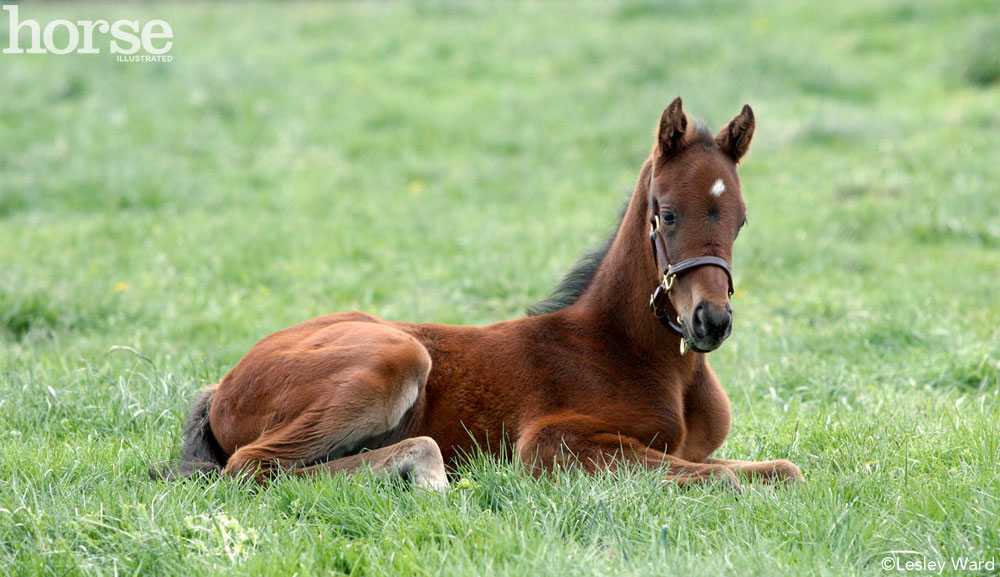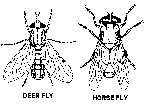
Your new foal has arrived, and you are undoubtedly thrilled at the prospect of raising him to be a strong, healthy and happy horse. His well-being will take diligent effort during these first few months. Make sure you have a plan in place for your horse’s first vet visits, vaccinations and day-to-day care.
Meet the Vet
The first step toward ensuring a healthy start is scheduling a vet visit within 24 hours after your foal is born to examine both mare and foal.
“It’s really important to have that 24-hour vet exam,” says Dr. Wendy Vaala, V.M.D., Dipl. ACVIM, Senior Equine Technical Services Veterinarian at Merck Animal Health. “Have the vet out to make sure there are no post-foaling injuries to the mare, examine the foal for any birth defects, draw a blood sample and measure to make sure the foal’s immunoglobulin (IgG) level greater than 800.”
The IgG level is an important measurement to assess the foal’s health at birth. Immunity is transferred from mare to foal, and a low IgG level indicates that something went wrong, either because the mare was not vaccinated properly, her colostrum (first milk) production was inadequate, or the foal has not nursed.
“I strongly believe in that first-day exam,” says Vaala. “There are so many things that can develop in that first three to five days for both the mare and the foal. For example, post-foaling mares have higher incidence of colic. Sometimes the entire placenta didn’t pass. Mares can become incredibly ill from retained placenta.
The 24-hour vet exam is recommended for all new foals, but if your mare or foal appears to be injured or sick, make an emergency call immediately. Even if your foal is healthy, keep a close eye on him during the first few days and look out for anything unusual.
“If you have a foal that’s fitful or restless, that’s abnormal,” says Vaala. “Look at your mare’s udder. That foal nurses several times an hour [during the first weeks]. If he misses even a few meals, the udder becomes distended and begins leaking milk. Any time you think your foal is beginning to fade, that’s the time to call your vet.”
Vaccinations
Assuming your mare was vaccinated appropriately before and during her pregnancy, your foal should have sufficient immunity for his first months of life.
“Owners need to understand that their foal’s first vaccination is that meal of colostrum,” says Vaala. “Those antibodies are what protect that foal for the first four to six months, so we don’t vaccinate until those antibodies have declined.”
Once your foal is old enough to receive vaccinations, your vet will help you decide which ones are necessary based on your location and your horses’ living situation.
“We recommend that foals receive the core vaccines in addition to two at-risk vaccines,” says Vaala. “Tetanus, Eastern and Western Equine Encephalitis (EEE and WEE) West Nile Virus (WNV) and rabies are the five core vaccines that every foal should receive within the first six to eight months of life. In addition, there are two that are essential for foals: equine herpesvirus (EHV) 1 and 4, and equine influenza.
“There are several other vaccines that would be considered at-risk vaccines that I encourage owners to discuss with their vet,” Vaala explains. “Potomac horse fever is one, as it only affects certain regions, and the available vaccines are not 100 percent effective. Botulism is another, and is a very concerning problem in some regions. The last at-risk vaccine is strangles. That one should only be administered if there is an extremely high risk on the farm.”
Parasite Control
When it comes to a deworming program for your foal, remember that babies have different parasite risks than adult horses do.
“Roundworms are the biggest concerns for the first six to eight months,” says Vaala. “They can cause impaction colic or ruptured bowel, and the juvenile form can migrate to a foal’s lungs. Strongyloides are a concern in foals as they can be passed in the mare’s milk to the foal. All other parasites are going to take some time to mature. Most dewormers aren’t effective against anything at a month of age.”
As with vaccinations, keeping your mare properly dewormed will help the foal.
“Start by deworming your mare either before she foals or within a few days of foaling. That guarantees that she’ll have relatively few parasite eggs in her manure, which is the first thing a lot of foals will chomp down on. I recommend waiting eight weeks to two months of age to start deworming.”
Vaala suggests having your vet perform a fecal exam to find out what your foal needs before administering his first dewormer. This helps control the problem of resistance by selectively targeting the parasites that are a threat to your foal. By having a fecal exam done before deworming, then again a few weeks after, you’ll know if the chemicals you’re using are effective against the worms you’re targeting.

Joining the Herd
During the first days of life, your mare and foal should remain mostly separate from the rest of the herd to solidify their bond and ensure their health. But eventually, it will be time for your horse to make new friends.
“I like to see a mare and foal kept by themselves or small groups [with other mares and foals] for the first one to two weeks,” says Vaala.
Socialization and playtime with other youngsters are important for a foal’s mental and physical development, but there are certain situations where you may need to keep your foal separated for a little extra time.
“Dummy foal syndrome typically displays itself in the first days of life,” says Vaala. “In those cases, a foal doesn’t recognize his dam and doesn’t know how to feed himself. Affected foals might take days and weeks to figure things out. I wouldn’t put that mare and foal out with others for a few days or weeks until the foal figures it out.
“Another case in which I would delay putting a mare and foal out is when a foal has an angular limb deformity,” continues Vaala. “These foals need restricted exercise. Maybe they can go out three or four times a day for 10 to 15 minutes. If you put an affected foal out with the big group, over exercise can really do some damage. But you can control their exercise during those early days.”
These guidelines apply to foals born on farms with other broodmares and foals. However, some non-commercial breeders might only have one foal on the farm in a year. If you don’t have a peer group for your new foal, the logistics around introducing him to the herd are more challenging.
“I prefer keep mares and foals away from an adult population,” says Vaala. “But that’s a judgment call. Some mares and foals are great with geldings, but some mares are extremely protective mothers, and then you get injuries.”
If you are uncertain of how your mare and foal will do in a herd with adult horses, keep them separated for the safety of all horses involved. Put them in their own paddock where they can see other horses, but remember to be cautious about biosecurity during the early days while your foal’s immune system is still developing.
“Pregnancy really reduces a mare’s immune system at the end, so you want to keep your pregnant mare from any other horses,” says Vaala. “Keep them away from horses that are traveling. You don’t want show horses anywhere near you broodmares and young foals. Think of your foal as a kindergartner going off to school for the first time. He’s going to come down with everything out there. You don’t need to challenge that foal’s immunity with everything that a show horse is exposed to.”
With the right care and attention, your mare and foal will enjoy a happy, healthy start.
Further Reading
Vaccinating Foals
Managing Parasites in Your Foal
Leslie Potter is managing editor of horseillustrated.com. Follow her on Twitter: @LeslieInLex.





Very important.